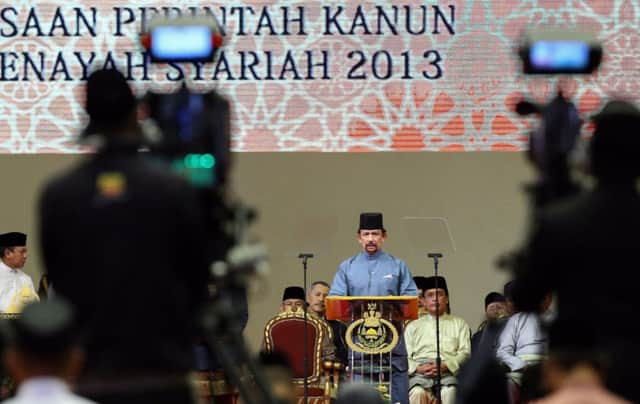Brunei’s sultan imposes Sharia law


The south-east Asian nation has begun phasing in a version that allows for penalties such as amputation for theft and stoning for adultery.
Human Rights Watch said it would allow for “brutal medieval punishments” that had no place in the modern world.
Advertisement
Hide AdAdvertisement
Hide AdMost of the punishments can be applied to non-Muslims, who account for about one-third of the 440,000 people in the oil-rich country. They are largely Buddhist and Christians.
Sultan Hassanal Bolkiah described the introduction of the law as a “great achievement” for Brunei. “The decision to implement the [Sharia penal code] is not for fun but is to obey Allah’s command as written in the Koran,” he said in a speech to announce the launch of the first phase.
The announcement sparked a strong response on social media, rare in Brunei.
As of yesterday, citizens can be fined or jailed by Islamic courts for offences such as not performing Friday prayers, pregnancy out of wedlock, propagating other religions and indecent behaviour.
The penal code will be introduced over three years, with offences in the first phase covered by fines and prison sentences.
Amputations will come under the second phase, along with stoning for “crimes” such as adultery and homosexual acts.
Human Rights Campaign, a US-based group that promotes lesbian, gay, bisexual and transgender equality, condemned the changes as “draconian”, saying the death penalty for gay sex – Brunei is the eighth nation to have such a law – was “horrific and sickening”.
Sultan Bolkiah said he did not expect the international community to accept the law but urged them to respect Brunei’s decision.
Advertisement
Hide AdAdvertisement
Hide AdLast month, the United Nations urged Brunei to delay the changes so they could be reviewed.
Rupert Colville, from the Office of the UN High Commissioner for Human Rights, told a news conference: “Under international law, stoning people to death constitutes torture or other cruel, inhuman or degrading treatment or punishment and is thus clearly prohibited.”
He added that the revised penal code “may encourage further violence and discrimination against women” due to “deeply entrenched” stereotypes.
Brunei is a conservative country where alcohol is banned and Muslim courts already govern family affairs. Its civil courts are based on British law, a leftover from the sultanate’s days as a British protectorate.
Muslims in neighbouring Malaysia are subject to a limited form of Islamic law that does not include amputation or capital punishment.
In general, the interpretation and practise of Islam in southeast Asia is more liberal than in parts of the Middle East and South Asia.